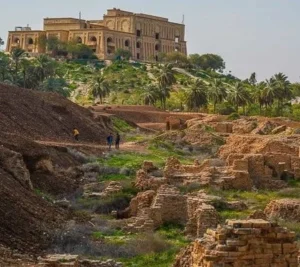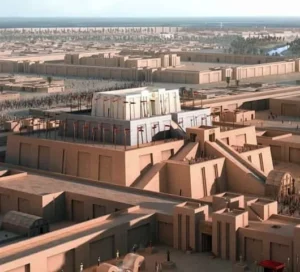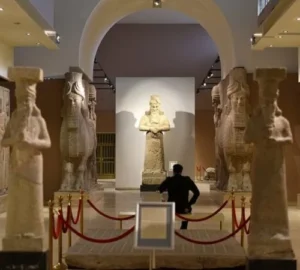Iraq
UTC+3 (Arabia Standard Time)
No daylight saving time observed
Iraqi Dinar (IQD)
US Dollars widely accepted in tourism areas
Cash is the primary payment method
Ancient Mesopotamia ("Cradle of Civilization")
Home to world's earliest known civilizations
Modern Iraq established in 1932
Republic Day celebrated on July 14
Visa required for most nationalities
Visa on arrival for some nationalities
Kurdistan Region has separate visa policy
Travel Advisory: Check your country's latest travel advisories before planning a trip to Iraq. Many countries advise against travel to certain regions. The security situation varies significantly across the country, with the Kurdistan Region generally considered safer for tourists.
Culture
Iraq's cultural heritage is among the oldest and richest in the world, as the land between the Tigris and Euphrates rivers (Mesopotamia) is considered the "Cradle of Civilization." This region witnessed the birth of writing, the wheel, agriculture, mathematics, astronomy, and the first known legal codes. Modern Iraqi culture blends this ancient heritage with Islamic influences and more recent developments.
Key elements of Iraqi culture include:
- Religious diversity: While Islam is the predominant religion (with both Shia and Sunni communities), Iraq is home to ancient Christian denominations (Assyrian, Chaldean, Syriac), Yazidis, Mandaeans, and a small remaining Jewish community. Religious sites such as Najaf and Karbala are major pilgrimage destinations for Shia Muslims worldwide.
- Ethnic diversity: Arabs form the majority, but Iraq has significant Kurdish, Turkmen, Assyrian, and other ethnic groups. The Kurdish population in northern Iraq has its own regional government, language, and distinct cultural traditions.
- Traditional arts: Calligraphy, particularly the ornate styles developed during the Abbasid period, remains an important art form. Other traditional arts include metalwork, carpet weaving, ceramics, and intricate woodcarving. The famous hanging gardens of Babylon reflect Iraq's ancient architectural achievements.
- Literature and poetry: Iraq has a rich literary tradition dating back to the Epic of Gilgamesh, one of the earliest known works of literature. Poetry holds special significance in Iraqi culture, both classical Arabic forms and folk poetry. Baghdad was once a global center of learning, with the House of Wisdom attracting scholars from around the world.
- Music: Traditional Iraqi music features instruments like the oud (lute), joza (rebab), and various percussion instruments. Each region has distinctive musical traditions, from the maqam of Baghdad to the Kurdish folk songs of the north.
Family ties are exceptionally strong in Iraqi society, with extended family networks providing economic and social support. Hospitality (diyafa) is a cornerstone of Iraqi culture, and guests are treated with great generosity and respect. Traditional clothing varies by region and community, with the dishdasha (long robe) common for men and the abaya worn by many women in more conservative areas.
Iraqi cuisine reflects the country's ancient agricultural heritage:
- Staple foods: Rice dishes, particularly biryani and quzi (rice with lamb and nuts), form the centerpiece of many meals
- Kebabs and grilled meats: Various forms of skewered meats, often served with bread and vegetables
- Stews (maraq): Slow-cooked dishes typically featuring lamb or chicken with vegetables and spices
- Mezze: Small dishes served as appetizers or side dishes, including hummus, baba ghanoush, and tabbouleh
- Bread: Various flatbreads such as samoon and khubz, essential accompaniments to most meals
- Dolma: Stuffed vegetables (grape leaves, onions, peppers) filled with rice, minced meat, and spices
- Kleicha: Date-filled pastries considered the national cookie of Iraq
Despite the challenges of recent decades, Iraqis maintain strong cultural traditions and are working to preserve and restore their rich heritage. Cultural festivals, particularly those associated with religious holidays and the spring Nowruz celebration in Kurdish regions, provide opportunities to experience traditional music, dance, and cuisine.
Tourism & Best Sites to Visit
Iraq possesses extraordinary historical and cultural sites spanning thousands of years of human civilization. While tourism infrastructure is still developing and security considerations must be taken seriously, intrepid travelers are increasingly visiting certain regions, particularly Iraqi Kurdistan and religious sites.
Note: Due to security considerations, many of Iraq's archaeological and historical sites have varying degrees of accessibility. Always check current conditions, travel with reputable guides, and follow security advisories before planning visits to specific locations.
Here are some of Iraq's most significant historical and cultural sites:





Babylon Archaeological Site: One of the most famous ancient cities in world history, dating back to the 18th century BCE. Once home to the legendary Hanging Gardens (one of the Seven Wonders of the Ancient World) and the Tower of Babel. The site includes the partially reconstructed Ishtar Gate, processional way, and various palaces and temples.
Citadel of Erbil: A UNESCO World Heritage site in the Kurdistan Region, this ancient fortified settlement sits on a tell (mound) rising about 30 meters above the surrounding city. Continuously inhabited for at least 6,000 years, it's one of the oldest continuously inhabited sites in the world. The citadel houses museums, traditional houses, and offers panoramic views of modern Erbil.
Ziggurat of Ur: An exceptionally well-preserved Sumerian temple tower dating back to the 21st century BCE. Part of the ancient city of Ur, traditionally considered the birthplace of the biblical patriarch Abraham. The massive stepped pyramid once served as a temple to the moon god Nanna.
Imam Ali Shrine: One of the holiest sites in Shia Islam, this magnificent golden-domed mosque in Najaf is the burial place of Imam Ali, cousin and son-in-law of the Prophet Muhammad. The shrine attracts millions of pilgrims each year, particularly during religious holidays, and features intricate Islamic architecture and decoration.
Iraqi Museum: Reopened in Baghdad after suffering looting during the 2003 invasion, this museum houses one of the world's most important collections of Mesopotamian antiquities. Exhibits include artifacts from Sumerian, Babylonian, Assyrian, and Islamic periods, providing insight into thousands of years of Iraqi heritage.
Other significant sites include the ancient city of Hatra with its blend of Hellenistic and Roman architecture; the Arch of Ctesiphon, the largest single-span vault of unreinforced brickwork in the world; the marshlands of southern Iraq, home to the unique culture of the Marsh Arabs; and Samarra with its famous spiral minaret. The Kurdistan Region offers mountain landscapes, waterfalls, and ancient sites with generally better tourism infrastructure than other parts of the country.
Transportation
Transportation in Iraq has improved significantly in recent years, though infrastructure quality and security considerations vary considerably by region. Major cities are connected by highways, and domestic flights link key destinations. For visitors, traveling with local guides or through organized tours is typically recommended.
Security Note: Transportation conditions in Iraq can change rapidly. Always consult current security information before travel and consider using reputable local transportation companies or guides, particularly for intercity journeys.
- Air travel: Domestic flights connect major cities including Baghdad, Basra, Najaf, Erbil, and Sulaymaniyah. Iraqi Airways is the national carrier, with several private airlines also operating domestic routes. Flying is often the safest and most convenient option for longer distances within the country.
-
Road travel: Iraq has an extensive road network, though quality varies. The main highways connecting Baghdad to other major cities have improved considerably, but secondary roads may be in poor condition. Security checkpoints are common on major routes.
- Taxis: Available in cities and for intercity travel, though agreeing on fares in advance is recommended
- Private cars: Many visitors arrange transportation through hotels or tour companies
- Buses: Intercity buses operate between major cities, but service quality varies
- Kurdistan Region: Transportation infrastructure is generally better developed in the Kurdistan Region, with good roads connecting major cities like Erbil, Sulaymaniyah, and Dohuk. Taxis and private car services are readily available, and the region has its own international airports.
-
Urban transportation: Options in major cities include:
- Taxis (both individual and shared service taxis)
- Limited public bus services
- App-based ride services in some cities (particularly in Kurdistan)
- Railways: Iraq's railway network has been significantly affected by conflict, with limited operational routes. Rehabilitation efforts are ongoing, but trains are not currently a practical option for most tourists.
Border crossings: Iraq shares land borders with Turkey, Iran, Kuwait, Saudi Arabia, Jordan, and Syria. The most commonly used border crossings for travelers are:
- Ibrahim Khalil/Habur crossing between Turkey and Iraqi Kurdistan
- Bashmakh and Haji Omran crossings with Iran (to/from Kurdistan Region)
- Trebil crossing with Jordan
Important considerations: When planning transportation in Iraq, consider these factors:
- Travel with appropriate documentation, as checkpoints are frequent
- Avoid night travel on highways outside major cities
- Be aware that GPS navigation apps may not be fully reliable in all areas
- Consider hiring drivers familiar with local conditions and routes
- Plan journeys with extra time to account for checkpoints and potential delays
Airports
Iraq has several international airports serving different regions of the country. These gateways have seen significant modernization and expansion in recent years, though security procedures remain stringent.
- Baghdad International Airport (BGW): The country's largest airport, located about 16 km west of Baghdad. This is the main hub for Iraqi Airways and handles the majority of international traffic to central Iraq. The airport offers connections to destinations throughout the Middle East, as well as limited service to Europe and Asia.
- Erbil International Airport (EBL): Located in the Kurdistan Region's capital, this modern facility serves as the main gateway to northern Iraq. The airport has seen significant development and has established itself as one of the more accessible entry points to Iraq for tourists and business travelers. It offers connections to numerous Middle Eastern, European, and Asian destinations.
- Sulaymaniyah International Airport (ISU): Also located in the Kurdistan Region, this airport serves Iraq's second-largest Kurdish city and offers international connections primarily to Middle Eastern and European destinations.
- Basra International Airport (BSR): Serving Iraq's southern port city and oil hub, this airport handles both domestic and international flights, with connections to various Middle Eastern countries.
- Najaf International Airport (NJF): An important gateway for religious tourism, located near the holy city of Najaf. It primarily serves pilgrims visiting the Imam Ali Shrine and other religious sites in southern Iraq.
Airport Transportation: Options for reaching your destination from Iraqi airports include:
- Airport taxis: Available at all international airports, though prices should be agreed upon before departure
- Hotel transfers: Many hotels offer airport pickup services, which can be arranged in advance and is often the most convenient option for visitors
- Private arrangements: Tour operators and travel agencies can arrange airport transfers as part of package tours
Important notes: Security procedures at Iraqi airports are comprehensive and can be time-consuming. It's advisable to arrive at least 3 hours before international flights. Documentation checks are thorough, so ensure all your travel documents are in order. Photography restrictions may apply in and around airports for security reasons.
Visa & Travel Information
Iraq's visa policies have evolved in recent years as the country works to develop tourism, particularly in more stable regions like Kurdistan. However, visa requirements remain relatively stringent for most nationalities.
Important: Visa regulations and security situations can change frequently. Always check the most up-to-date information from official sources and your country's foreign affairs department before planning travel to Iraq.
Visa Options by Region
The following table outlines the main visa options for visitors to Iraq:
| Region | Visa Type | Notes |
|---|---|---|
| Federal Iraq (Central/South) | Pre-arranged Visa Required | Must be obtained before arrival through Iraqi embassies/consulates |
| Kurdistan Region | Visa on Arrival Available | Available for many nationalities at Erbil and Sulaymaniyah airports for 30 days |
| Religious Tourism | Special Religious Visa | Available at certain airports (e.g., Najaf) for pilgrims visiting holy sites |
| Business Travel | Business Visa | Requires letter of invitation from Iraqi sponsor |
Kurdistan Region Entry: The Kurdistan Regional Government (KRG) maintains a separate visa policy from the federal Iraqi government. Many nationalities can obtain a 30-day visa on arrival at Erbil and Sulaymaniyah airports, though policies can change. Important considerations:
- A Kurdistan Region visa does not permit travel to federal Iraq (outside Kurdistan)
- Having Israeli stamps in your passport can result in entry denial
- Visa extensions are possible through KRG immigration offices
- Some consulates issue Kurdistan Region visas in advance
Federal Iraq Visa Process: For travel to areas outside Kurdistan, most visitors require a visa obtained in advance through Iraqi diplomatic missions. The application typically requires:
- Valid passport with at least six months validity
- Completed application forms
- Letter of invitation from an Iraqi sponsor (company, organization, or hotel)
- Proof of travel arrangements and accommodation
- Processing times vary considerably by country
Important Travel Considerations
- Security: Security situations vary significantly across regions. The Kurdistan Region is generally more stable than other parts of Iraq. Many countries maintain travel advisories recommending against travel to certain or all areas of Iraq - check these before planning your trip.
- Health: Medical facilities meeting international standards are limited to major cities. Comprehensive travel health insurance with evacuation coverage is strongly recommended. Consider vaccinations for hepatitis A and B, typhoid, and routine immunizations.
- Cultural considerations: Iraq is a conservative country with strong religious traditions. Modest dress is expected, particularly for women. During Ramadan, eating, drinking, and smoking in public during daylight hours should be avoided out of respect.
- Photography: Be cautious when taking photographs, especially of government buildings, security personnel, or infrastructure. Always ask permission before photographing people.
Best time to visit: Iraq has a hot desert climate with significant seasonal variations:
- Spring (March to May) and autumn (September to November): Generally the most pleasant seasons for visiting, with milder temperatures
- Summer (June to August): Extremely hot throughout the country, with temperatures regularly exceeding 45°C (113°F) in southern regions
- Winter (December to February): Mild in the south but can be cold and snowy in northern mountainous regions of Kurdistan
Communication: Mobile coverage is good in urban areas, with several operators offering services. Purchasing a local SIM card requires registration with identification. Internet access is available in major cities and hotels, though speeds vary. Some social media platforms and websites may be periodically restricted.